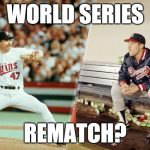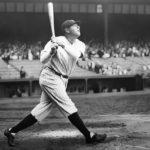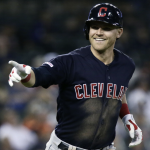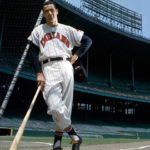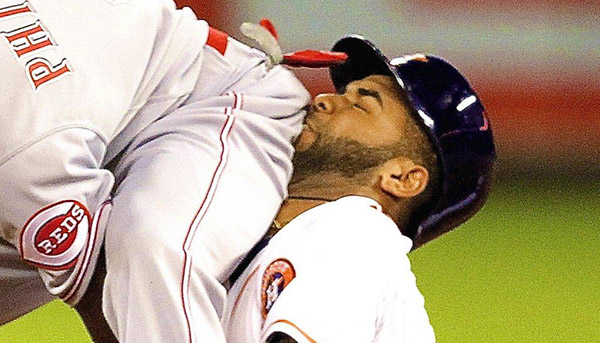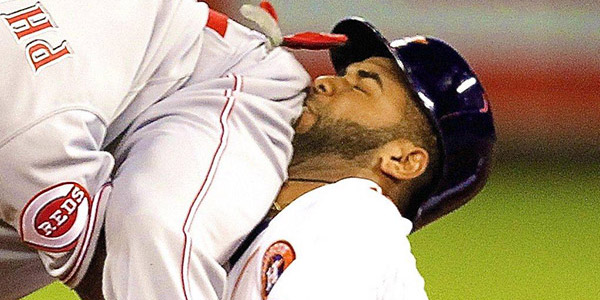Rain Delays and the Love of Baseball
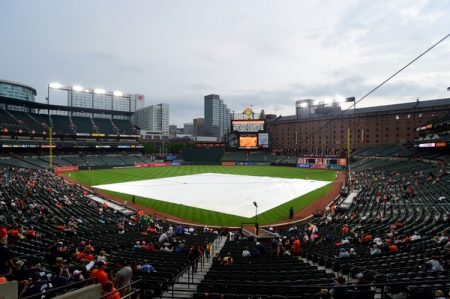 In a revealing article entitled, Rob Manfred goes to bat against fans in latest rain-delay rip-offs, the New York Post’s sports media critic, Phil Mushnick, argues that in rainout upon rainout, MLB has clearly opted for callous indifference to the needs of its paying fans. Essentially, not only taking them for granted but in effect saying that once an MLB team has counted its gate revenue for a game, there’s no incentive to return the money or allow fans to choose another game to attend. This elitist policy is the result of an almost imperial attitude by ownership. It’s their team, their players and their territory. They’ll tell fans when they’ll begin their games—rain delays after rain delays—whenever they damn want them to. Because they understand how much fans love baseball.
In a revealing article entitled, Rob Manfred goes to bat against fans in latest rain-delay rip-offs, the New York Post’s sports media critic, Phil Mushnick, argues that in rainout upon rainout, MLB has clearly opted for callous indifference to the needs of its paying fans. Essentially, not only taking them for granted but in effect saying that once an MLB team has counted its gate revenue for a game, there’s no incentive to return the money or allow fans to choose another game to attend. This elitist policy is the result of an almost imperial attitude by ownership. It’s their team, their players and their territory. They’ll tell fans when they’ll begin their games—rain delays after rain delays—whenever they damn want them to. Because they understand how much fans love baseball.
When they tell the umpire to scream, Play Ball! even if it’s at 9:30 pm in Boston or Baltimore or Pittsburgh, they know how much fans love baseball. Rain delays be damned.
The Sound of Ownerships’ Derision
Mushnick and the New York City Councilman he references in his article are both right. In this age of higher player costs, teams will not return gate receipts without a hurricane canceling the action. And even if every ticket holder agrees to attend a rescheduled game, management would rather get the game out of the way. Now. Rain and slippery (dangerous) conditions and all.
Ownership can take this cavalier attitude because baseball franchises are no longer mom and pop businesses but fiefdoms. And their customers, the fans, love baseball.
The New York Yankees, Chicago Cubs, Los Angeles Dodgers and St. Louis Cardinals are more than baseball teams. They are powerful domains under the control of a ruler or wealthy leader(s). Families. People speak of the Steinbrenner family when they reference Yankees ownership. Or the Ricketts family when the Cubs are mentioned.
Which is why the policies and procedures these ruling groups establish are the law of the land in their territories. Granted, the businesses all exist under the rubric of MLB, but MLB cannot micromanage teams.
All Rob Manfred, the Commissioner of MLB, could offer about the recent rash of two- and three-hour, rain-delayed games [quoted in the New York Post] was a weak excuse: The challenge we face in scheduling and rescheduling is fitting each club’s 162 games into a span of 186 days.
Talk about an obvious non-sequitur. Yawn. But then, what could Manfred really say? He can’t reveal the con game ownership plays. He works for ownership. Not the fans. Besides, Manfred understands the dirty little secret of ownership. It’s tough to ruin a masterpiece. Since fans love baseball, and management knows this, they can keep pushing to collect every cent possible without any worry about alienating fans. So, Manfred talks about scheduling problems. And ownership laughs louder with every new excuse.
Mushnick’s written response? But how does that justify suckering customers? How does that excuse MLB from offering patrons a choice between a lose-lose in rotten weather — staying put and risking losing their money or attending and risking their time, ticket money and added money for travel, parking, stadium food and drink during a two- or three-hour wait in cold, wind and rain?
Baseball as a Cultural System
The answer could be baseball has become an integral part of what makes America America and not France or Japan. And the cost, that’s also pure Americana. Americans overpay for what they like. Look at the exorbitant charges of cable TV. FIOS. A Broadway show. An Apple iPad. Why not baseball games?
But, baseball also means a lot to millions of Americans. And not just the actual playing of the games themselves, but the ritual cycle of the season. The language, sounds and tastes of the game. The beauty of the field. Not to mention the art of hitting and throwing and fielding the ball. And then there’s the struggle to win. And the way all these sights, sounds and symbols satiate our souls.
So, when a season ends, it’s like a death in the family. Fans scour the house for something else to nourish their souls. All the while knowing in 14 or 15 weeks the flowers will begin blooming again. Honeysuckle will scent the air. And somewhere someone will shout “Play ball!” And the sound of a bat striking a ball will soothe the mind, once again.
That’s why fans put up with the impudence of baseball management and wait hours for games to begin. Management understands these needs for simple sustenance. These needs for the perfection of a home run, for an athletic snare of a line drive or for a sublime curveball that floats over home plate like a butterfly gently dropping onto a branch. These are the poetic images that feed our senses. That read like the prose of Donald Hall or John Ashberry painting word pictures of great moments onto a balletic montage of vignettes that enrich our perceptions.
From the catlike lunges across the third base line and long throws across the diamond by Brooks Robinson to the powerful subtlety of Sandy Koufax’ graceful leg kick to Ken Griffey Jr.’s swift gallop across outfield grass to grasp a dart cascading through mid-air to Ozzie Smith’s velvety gloss as he encircled ball after ball before snapping orbs accurately across the diamond, baseball fans want more artistry. Nor can they forget Mickey Mantle’s long, loping practice swings in the batter’s box,or Rocky Colavito’s deliberate swings that stopped with his bat pointing directly at the pitcher as if he was accusing that pitcher of some heinous act other than throwing the ball over home plate. And one other memory, the long, slow graceful left-handed arc of Darryl Strawberry’s bat as it swept through the strike zone rocketing balls to all fields, some even majestically sweeping over outfield fences.
These are the Reasons …
Fans wait hours for a ballgame to begin after a long rain delay. For the chance to experience magic. To see a spell cast. To even feel the pain of coming up short, one more time. Like those Brooklyn fans who were forever shouting, wait till next year. And then next year came in Brooklyn. But only once, in 1956.
The next World Series championships came soon after in 1959, 1963, and 1965. All of them after the Dodgers left Brooklyn in 1957. So, they didn’t count. In Brooklyn. But Los Angeles rejoiced.
But 1956 made all that pain dissolve, in Brooklyn. For a championship means so much more. A lifetime of satisfaction. The chance to see a Tommie Agee make two of the greatest catches ever in centerfield during the 1969 World Series. Or Reggie Jackson’s climactic three home runs in game six of the 1977 World Series against the Dodgers. Then there’s the opposite, the ignominious moment. Bill Buckner’s classic miscue in the 1986 World Series that cost the Red Sox the World Series.
These moments and many others are the stuff of baseball. What we passionately believe. What we think about. Why fans love baseball. Just as the first sounds of a wooden bat thwacking a ball in spring training promise more baseball. Promise a rosy future, maybe even a championship. Certainly a great summer. Although sometimes all there is to remember is that strikeout to end the game. And another tomorrow.
That’s why fans sit and wait for the game to begin as the rain pelts the tarpaulin. Not because the imperious billionaires see dollar signs on every game and every player and don’t know how to stop grabbing for more dollars. But because hidden under the tarpaulin is the next memory. The next magic act. All the reasons fans love baseball.

